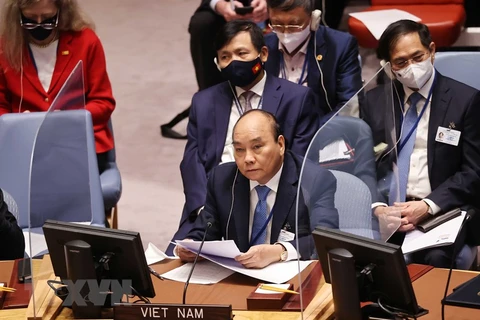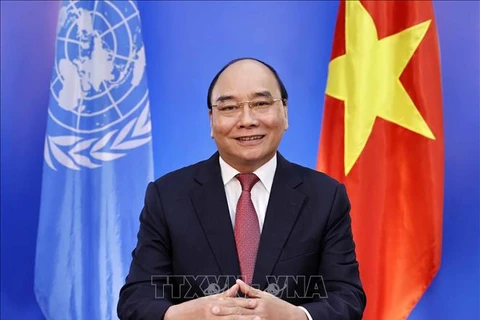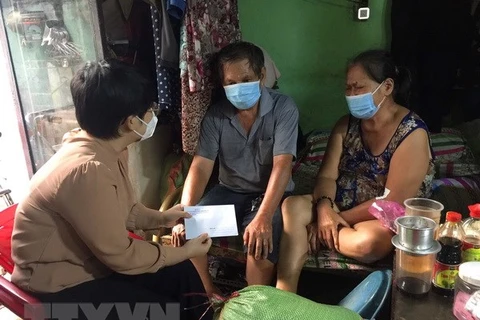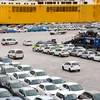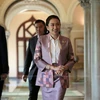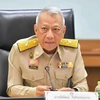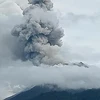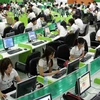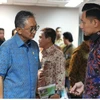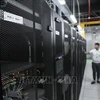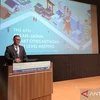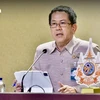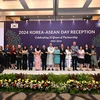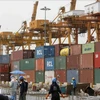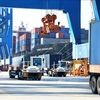Singapore (VNA) - The COVID-19 pandemic is a wake-up call that's highlighted the urgency to fight the world’s food waste crisis, experts and industry players told CNBC.
Amid global lockdowns and halted travel, the pandemic exposed the vulnerabilities of supply networks, as disruptions created bottlenecks in farm labour, transport and logistics and sparked global food shortages and price hikes.
The pandemic is a very good wake-up call, said William Chen, Director of the Food Science and Technology Programme at Nanyang Technological University in Singapore.
"Before COVID-19, people took climate change less seriously because food came by easily. But now this issue starts to surface in people’s minds,” he added. “I don’t see it as a lost cause, but a good opportunity to do a house-cleaning of the current system.”
The Food and Agriculture Organization of the United Nations (FAO) estimates that one third of all food produced, or 1.3 billion tonnes, ends up lost or wasted every year. Food waste also accounts for 8-10 percent of global greenhouse gas emissions, another UN report showed.
Reducing food waste could yield 700 billion USD in savings, according to Boston Consulting Group. And businesses in Southeast Asia are jumping on the bandwagon and going into food waste prevention, as well as redistribution and recycling of excess food.
In 2020, Singapore generated 665,000 tonnes of food waste, making up about 11 percent of the total waste generated in Singapore.
Coming out of the pandemic, more hotels and airlines are now tackling food waste and putting sustainability “front and center” on their priority list, said Rayner Loi, co-founder and chief executive of Singapore-based AI food waste management start-up, Lumitics.
This was a stark change from a few years back when food waste was “barely on the radar” and it was “incredibly challenging” to have conversations with industry players, said Loi.
The firm developed an artificial intelligence-powered tracker installed in dustbins to measure and track all food waste. By learning in real time what and how much food waste was generated, chefs could take action to reduce the amount produced for certain dishes on the buffet line.
This reduces food waste by up to 40 percent, and food costs by up to 8 percent, Lumitics found.
Lumitics partners large hotel chains like Accor, Hyatt, Marina Bay Sands, as well as carriers such as Singapore Airlines and Etihad Airways.
It plans to expand to 1,000 locations in the next five years across Asia-Pacific starting with Hong Kong, Malaysia, Indonesia and Australia.
Another player fighting food waste is Yindii, a Thai anti-food waste startup. It launched an app to connect eco-conscious Bangkok residents with bakeries, cafes, supermarkets and restaurants.
These businesses fill up their unsold inventory in “surprise boxes,” which customers can snap up at discounted prices of 50 to 80 percent off at the end of the day, and get them delivered to their homes.
Yindii founder and French entrepreneur Louis-Alban Batard-Dupre described Bangkok’s food waste situation as “catastrophic,” where only 2 percent of food waste is recycled.
In Thailand, some 17 million tonnes of unused food is dumped each year, and about 64 percent of its 27.4 million tonnes of waste is made up of organic waste, which includes food and kitchen waste./.
Amid global lockdowns and halted travel, the pandemic exposed the vulnerabilities of supply networks, as disruptions created bottlenecks in farm labour, transport and logistics and sparked global food shortages and price hikes.
The pandemic is a very good wake-up call, said William Chen, Director of the Food Science and Technology Programme at Nanyang Technological University in Singapore.
"Before COVID-19, people took climate change less seriously because food came by easily. But now this issue starts to surface in people’s minds,” he added. “I don’t see it as a lost cause, but a good opportunity to do a house-cleaning of the current system.”
The Food and Agriculture Organization of the United Nations (FAO) estimates that one third of all food produced, or 1.3 billion tonnes, ends up lost or wasted every year. Food waste also accounts for 8-10 percent of global greenhouse gas emissions, another UN report showed.
Reducing food waste could yield 700 billion USD in savings, according to Boston Consulting Group. And businesses in Southeast Asia are jumping on the bandwagon and going into food waste prevention, as well as redistribution and recycling of excess food.
In 2020, Singapore generated 665,000 tonnes of food waste, making up about 11 percent of the total waste generated in Singapore.
Coming out of the pandemic, more hotels and airlines are now tackling food waste and putting sustainability “front and center” on their priority list, said Rayner Loi, co-founder and chief executive of Singapore-based AI food waste management start-up, Lumitics.
This was a stark change from a few years back when food waste was “barely on the radar” and it was “incredibly challenging” to have conversations with industry players, said Loi.
The firm developed an artificial intelligence-powered tracker installed in dustbins to measure and track all food waste. By learning in real time what and how much food waste was generated, chefs could take action to reduce the amount produced for certain dishes on the buffet line.
This reduces food waste by up to 40 percent, and food costs by up to 8 percent, Lumitics found.
Lumitics partners large hotel chains like Accor, Hyatt, Marina Bay Sands, as well as carriers such as Singapore Airlines and Etihad Airways.
It plans to expand to 1,000 locations in the next five years across Asia-Pacific starting with Hong Kong, Malaysia, Indonesia and Australia.
Another player fighting food waste is Yindii, a Thai anti-food waste startup. It launched an app to connect eco-conscious Bangkok residents with bakeries, cafes, supermarkets and restaurants.
These businesses fill up their unsold inventory in “surprise boxes,” which customers can snap up at discounted prices of 50 to 80 percent off at the end of the day, and get them delivered to their homes.
Yindii founder and French entrepreneur Louis-Alban Batard-Dupre described Bangkok’s food waste situation as “catastrophic,” where only 2 percent of food waste is recycled.
In Thailand, some 17 million tonnes of unused food is dumped each year, and about 64 percent of its 27.4 million tonnes of waste is made up of organic waste, which includes food and kitchen waste./.
VNA
